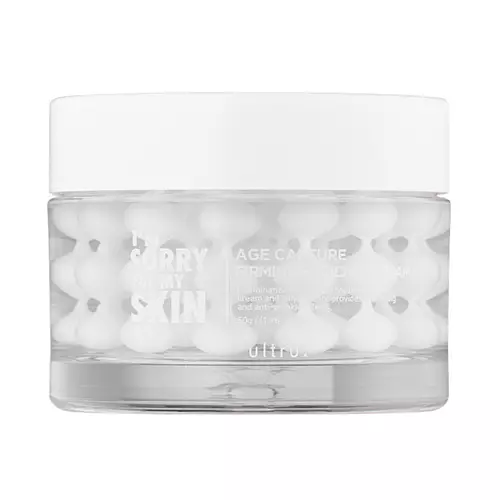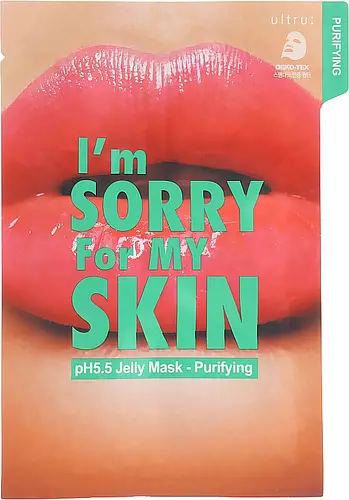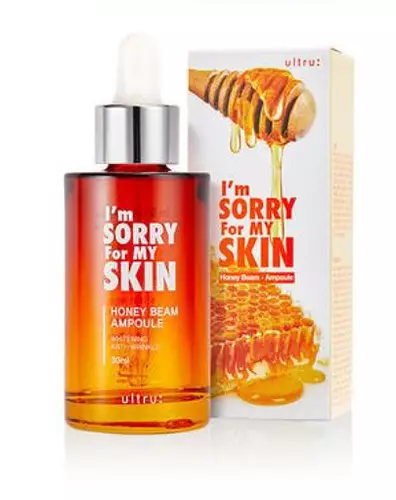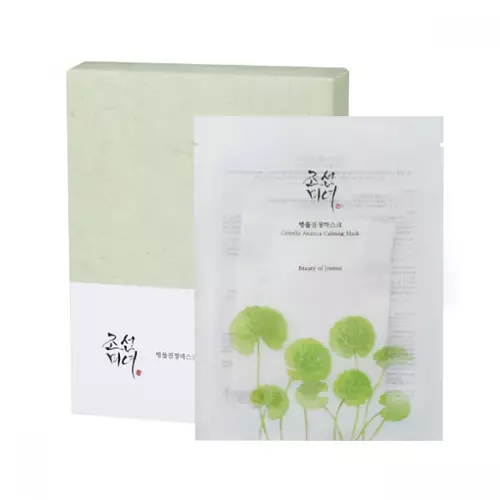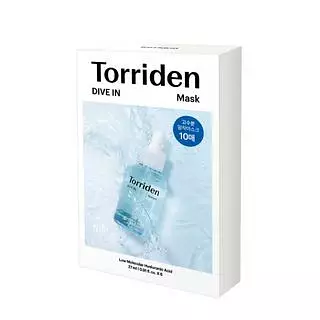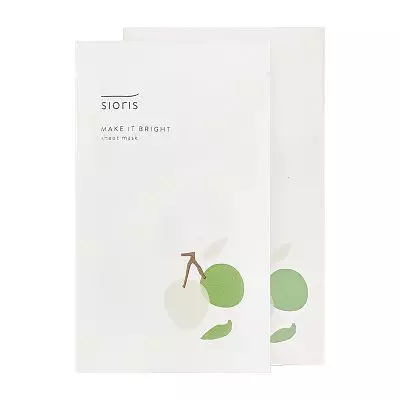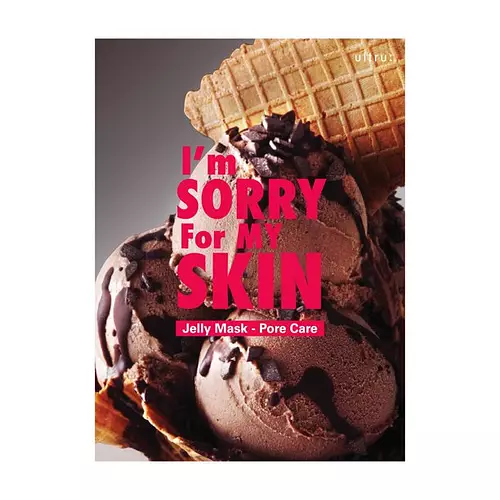
I'm Sorry For My Skin Jelly Mask – Pore Care Ingredients Explained
Published on June 06, 2023 Submitted by hyggeday
Overview
What it is
Sheet mask with 35 ingredients that contains exfoliants
Cool Features
It is reef safe
Suited For
It has ingredients that are good for dry skin and brightening skin
Free From
It doesn't contain any harsh alcohols, common allergens, parabens or sulfates
Fun facts
I'm Sorry For My Skin is from South Korea.
We independently verify ingredients and our claims are backed by peer-reviewed research. Does this product need an update? Let us know.
Ingredient List (35)
Water, Butylene Glycol, Glycerin, Citrus Paradisi Fruit Extract, Bis-Peg-18 Methyl Ether Dimethyl Silane, Peg-60 Hydrogenated Castor Oil, Ammonium Acryloyldimethyltaurate/Vp Copolymer, Polyacrylic Acid, Dimethicone, Anthemis Nobilis Flower Extract, Castanea Crenata Shell Extract, Sciadopitys Verticillata Root Extract, Potassium Hydroxide, Cellulose Gum, Ethylhexylglycerin, Theobroma Cacao Extract, Oenothera Biennis Root Extract, Abronia Villosa Leaf Extract, Opuntia Coccinellifera Flower Extract, Agave Americana Stem Extract , Yucca Brevifolia Root Extract, Fouquieria Splendens Stem Extract, Larrea Tridentata Extract, Gardenia Florida Fruit Extract, Trehalose, Tamarindus Indica Seed Polysaccharide, Lecithin, Myrothamnus Flabellifolia Leaf Extract, Silica, Nasturtium Officinale Extract, 1,2-Hexanediol, Polyquaternium-51, Disodium EDTA, Phenoxyethanol, Parfum
You should know
Notable Ingredients
This product contains 1 ingredient that may have this attribute:
Benefits
This product contains 1 ingredient that may have this attribute:
This product contains 1 ingredient that may have this attribute:
Concerns
Ingredient Info
Alcohol Free
This product is free of harsh alcohols 🎉
Contains Silicon
Ingredients in this product that are types of silicon:
Contains Fragrance
Ingredients in this product that are forms of fragrance:
Sulfate Free
This product is free of sulfates 🎉
Paraben Free
This product is free of parabens 🎉
Contains Oils
Ingredients in this product that are types of oil:
Not Malassezia Safe
Ingredients in this product that are not malassezia safe:
Reef Safe
This product is free of ingredients that damage reefs 🎉
EU Allergen Free
This product is free of EU allergens 🎉
Non Vegan
This product is not vegan 😥
Not Cruelty Free
This product is not cruelty-free 😥
Ingredients Overview
Ingredients Explained
Water. It's the most common cosmetic ingredient of all. You'll usually see it at the top of ingredient lists, meaning that it makes up the largest part of the product.
So why is it so popular? Water most often acts as a solvent - this means that it helps dissolve other ingredients into the formulation.
You'll also recognize water as that liquid we all need to stay alive. Talk about multi-purpose! If you see this, drink a glass of water. Stay hydrated!
Learn more about WaterButylene Glycol (or BG) is used within cosmetic products for a few different reasons:
- It is a solvent, meaning that it helps to dissolve other ingredients. This also enhances the absorption of the product into one's skin.
- It is a humectant, which means that it helps attract moisture into the skin.
- It helps improve product application.
Overall, Butylene Glycol is a safe and well-rounded ingredient. It is unlikely to irritate skin, and works well with pretty much all other ingredients.
Glycerin is already naturally found in your skin. It helps moisturize and protect your skin.
A study from 2016 found glycerin to be more effective as a humectant than AHAs and hyaluronic acid.
As a humectant, it helps the skin stay hydrated by pulling moisture to your skin. The low molecular weight of glycerin allows it to pull moisture into the deeper layers of your skin.
Hydrated skin improves your skin barrier; Your skin barrier helps protect against irritants and bacteria.
Glycerin has also been found to have antimicrobial and antiviral properties. Due to these properties, glycerin is often used in wound and burn treatments.
In cosmetics, glycerin is usually derived from plants such as soybean or palm. However, it can also be sourced from animals, such as tallow or animal fat.
This ingredient is organic, colorless, odorless, and non-toxic.
Glycerin is the name for this ingredient in American English. British English uses Glycerol/Glycerine.
Learn more about GlycerinWe don't have a description for Citrus Paradisi Fruit Extract.
Bis-Peg-18 Methyl Ether Dimethyl Silane belongs to the siloxanes and silicones classes. It is synthetically created and has a waxy composition.
Bis-Peg-18 Methyl Ether Dimethyl Silane is a humectant and emollient, meaning it helps hydrate the skin. Humectants draw moisture to your skin, while emollients prevent moisture from escaping.
Peg-60 Hydrogenated Castor Oil comes from hydrogenated castor oil. It is a solubilizer and emulsifier.
As a solubilizer, it helps dissolve ingredients into a water-based version. It is also an emulsifer. Emulsifier help prevent oils and water from separating. Both these properties help create evenly-spread and uniform products.
Basically, Peg-60 Hydrogenated Castor Oil helps hold ingredients together.
Learn more about Peg-60 Hydrogenated Castor OilAmmonium Acryloyldimethyltaurate/Vp Copolymer (let's call it AAVC for short) is a synthetically created polymer. It's used as a film-forming agent and used to thicken the consistency of products.
AAVC is able to increase the consistency and viscosity of products due to its large molecule size. It also prevents ingredients from separating.
We don't have a description for Polyacrylic Acid.
Dimethicone is a silicone used for making products smooth and silky. It also has the added benefit of sealing in hydration. The amount of dimethicone found in beauty products is considered safe and non-comedogenic, meaning it won't clog pores.
Dimethicone has been found increase absorption in skin, boosting the benefits of other ingredients. While there is concern for the safety of dimethicone, the levels used in skincare are safe for use.
Anthemis Nobilis Flower Extract is from the Roman Chamomile flower.
Anthemis Nobilis Flower Extract helps soothe the skin and contains antioxidants. Antioxidants help fight free-radicals. Free-radicals are molecules that may damage your skin cells
Castanea Crenata Shell Extract comes from the shell of the chestnut.
Studies show chestnut shells to have antioxidant and anti-inflammatory properties.
Antioxidants protect your skin against damaging molecules. This may help reduce the signs of aging.
Learn more about Castanea Crenata Shell ExtractWe don't have a description for Sciadopitys Verticillata Root Extract.
Potassium hydroxide is commonly known as caustic potash. It is used to fix the pH of a product or as a cleaning agent in soap. In cleansers, it is used for the saponification of oils.
Sapnification is the process of creating fatty acid metal salts from triglycerides and a strong base. During this process, Potassium Hydroxide is used up and is not present in the final product.
Using high concentrations of Potassium Hydroxide have shown to irritate the skin.
Learn more about Potassium HydroxideCellulose Gum is a water-soluble polymer that comes from cellulose. It is used to change the texture of a product and to help stabilize emulsions.
As an emulsifier, cellulose gum specifically thicken the texture of water-based products.
This ingredient is considered hypoallergenic and non-toxic. Cellulose Gum can be found in cosmetics, food, and other household goods such as paper products.
Learn more about Cellulose GumEthylhexylglycerin (we can't pronounce this either) is commonly used as a preservative and skin softener. It is derived from glyceryl.
You might see Ethylhexylglycerin often paired with other preservatives such as phenoxyethanol. Ethylhexylglycerin has been found to increase the effectiveness of these other preservatives.
This ingredient is extracted from the seeds of the cocoa tree.
Cacao seeds contain antioxidants known as polyphenols. These include flavonoids, procyanidins, and epicatechins.
Studies show these polyphenols help improve skin health.
The more famous ingredient from cocoa tree is cocoa butter.
Learn more about Theobroma Cacao ExtractWe don't have a description for Oenothera Biennis Root Extract.
We don't have a description for Abronia Villosa Leaf Extract.
We don't have a description for Opuntia Coccinellifera Flower Extract.
We don't have a description for Agave Americana Stem Extract.
We don't have a description for Yucca Brevifolia Root Extract.
We don't have a description for Fouquieria Splendens Stem Extract.
We don't have a description for Larrea Tridentata Extract.
We don't have a description for Gardenia Florida Fruit Extract.
Trehalose is a disaccharide made of two glucose molecules (glucose is sugar!). Trehalose is used to help moisturize skin. It also has antioxidant properties.
As a humectant, trehalose helps draw moisture from the air to your skin. This helps keep your skin hydrated.
Due to its antioxidant properties, trehalose may help with signs of aging. Antioxidants help fight free-radical molecules, unstable molecules that may damage your skin.
In medicine, trehalose and hyaluronic acid are used to help treat dry eyes.
Some animals, plants, and bacteria create trehalose as a source of energy to survive freeze or lack of water.
Learn more about TrehaloseWe don't have a description for Tamarindus Indica Seed Polysaccharide.
Lecithin is a term for a group of substances found in plants, animals, and humans. They are made up of mixture of fatty acids. These fatty acids usually are a mixture of phosphoric acid's choline ester connected to stearic, oleic, and palmitic acids. Most lecithins are created from plant ingredients scuh as sunflower.
Lecithin is an emollient. Emollients help soften the skin and creates a barrier to keep moisture in.
As an emulsifier, it also helps prevent water and oil ingredients from separating. Lecithin can help ingredients be better absorbed by the skin. The phospholipids in Lecithin can produce liposomes. Liposomes help other ingredients get through the skin barrier.
Learn more about LecithinWe don't have a description for Myrothamnus Flabellifolia Leaf Extract.
Silica is a mineral naturally found in our skin. It helps to thicken and smooth the texture of a product. It also acts as an agent for other ingredients by increasing the absorption of other ingredients into the skin.
Silica is often used for absorption and can help reduce shine when products are applied. Silica occurs in naturally in materials like clay and sandstone, and it can also be produced synthetically.
Silica is present naturally within the skin during collagen production and when reducing inflammation.
Learn more about SilicaNasturtium Officinale Extract is a fragrance.
1,2-Hexanediol is a multi-tasker ingredient. It acts as a preservative to increase shelf-life and can aid other preservatives in preventing microbe growth. 1,2-Hexanediol also helps the skin retain moisture as a humectant.
In products that are water-based, this ingredient can help stabilize perfumes and fragrances. It can also help make the texture of products softer and more smooth.
Polyquaternium-51 is a polymer salt. It helps hydrate the skin by creating a film on top. This film traps moisture in, keeping your skin soft and hydrated.
Disodium EDTA plays a role in making products more stable by aiding other preservatives.
It is a chelating agent, meaning it neutralizes metal ions that may be found in a product.
Disodium EDTA is a salt of edetic acid and is found to be safe in cosmetic ingredients.
Learn more about Disodium EDTAPhenoxyethanol is a preservative that has germicide, antimicrobial, and aromatic properties. Studies show that phenoxyethanol can prevent germ and microbial growth. By itself, it has a scent that is similar to that of a rose.
It's often used in formulations along with Caprylyl Glycol to preserve the shelf life of products.
Parfum is a catch-all term for an ingredient or more that is used to give aroma to products. Parfum, or fragrance, can be a blend of hundreds of chemicals or plant oils. This means every product with "fragrance" or "Parfum" in the ingredients list is a different mixture.
In the US, the alternative name for parfum is 'fragrance'. The term 'fragrance' is not regulated in many countries. In many cases, it is up to the brand to define this term.
For instance, many brands choose to label themselves as "fragrance-free" because they are not using synthetic fragrances. However, their products may still contain ingredients such as essential oils that are considered a fragrance. One example is Calendula flower extract. Essential oil ingredients still impart a scent or 'fragrance'.
Depending on the blend, it can cause allergies and sensitivities on the skin. Some ingredients that are known EU allergens include linalool and citronellol.
Products use parfum often to give products a scent or cover up smells of different ingredients.
The bottom line is: not all fragrances/parfum/ingredients are created equally. If you are worried about fragrances, we recommend taking a closer look at an ingredient. And of course, we always recommend speaking with a professional.
Learn more about ParfumBeautiful widgets for your website
Here's what our community thinks of the 35 ingredients in this product ✨
We're dedicated to providing you with the most up-to-date and science-backed ingredient info out there.
The data we've presented on this page has been verified by a member of the SkinSort Team.
Read more about usCompared With
Here are some products that I'm Sorry For My Skin Jelly Mask – Pore Care is often compared with.
Want to compare it with a different product? Head on over to our comparisons tool and you can!
